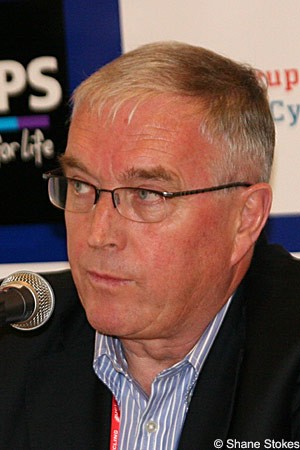Many of the sport’s biggest directors would be excluded under new proposal
 International Cycling Union (UCI) president Pat McQuaid has called for the banning of former professional riders who have been convicted of doping offences in their careers from becoming team managers. In an interview with the BBC, McQuaid said that he wanted to end the cycle of doping in the sport, and feels that this measure will help with that.
International Cycling Union (UCI) president Pat McQuaid has called for the banning of former professional riders who have been convicted of doping offences in their careers from becoming team managers. In an interview with the BBC, McQuaid said that he wanted to end the cycle of doping in the sport, and feels that this measure will help with that.
“I’m not happy there are team managers who have been doping as athletes themselves,” he told BBC Sport. “I’m not happy they understand the responsibility they have to the sport.”
The article didn’t state if the ruling would apply to those who had doped in the past. Should the proposal be adopted under that strict criteria, Saxo Bank-SunGard manager Bjarne Riis, Leopard Trek manager Kim Andersen, Euskaltel-Euskadi manager Igor Gonzalez de Galdeano and HTC-Highroad manager Rolf Aldag are some of those at the top of the list of those that could be prevented from working with their teams. While Gonzalez de Galdeano and Andersen tested positive during their careers though, Riis and Aldag only admitted to doping at some point in their careers after they retired; they never actually tested positive, and so their exclusion could be difficult to enforce legally.
Garmin-Cervélo manager Jonathan Vaughters has also hinted, although never officially admitted, that he may have been party to illegal practices while a member of the United States Postal Service (USPS) team in the late 1990’s. Since then, he American has set up what is now the Garmin-Cervélo team, which he has positioned at the vanguard of the anti-doping movement, motivated by his own experiences in the sport.
As well as running his team, Vaughters is also the president of the Association of Professional Cycling Teams (AIGCP) and sits on the UCI Management Committee.
Whether or not any new regulation would be enforced retrospectively, McQuaid doesn’t say; his proposal, which he is to put before the UCI management committee in June, is straightforward to him though.
“Any cyclist who is involved in a doping infraction in their career cannot come back into management of a team in the future,” he said. “We do suffer. And all sports suffer, from the fact that athletes tend to become officials afterwards. There’s a constant circle, and it’s very hard to break.”
It’s worth noting however that, while the sport could be denied the Garmin-Cervélo team, certain notorious doping managers and alleged doping managers would still be welcomed.
Manolo Saiz, the long time manager of the ONCE and Liberty Seguros team, who was allegedly embroiled in the Operación Puerto scandal was never a racing cyclist and so could not have ever tested positive. Similarly Bruno Roussel, the manager that oversaw the notorious team wide doping programme at Festina, would have the opportunity to manage a team.
While it’s clear that a character like Roussel would not be welcomed back to the sport – he did, after all, serve jail time for his part in the organised doping of his team – the proposal McQuaid describes would assume him, as someone who comes from outside the sport, as more trustworthy than a repentant former rider.
What the proposal would amount to, in essence, would be a suspended life ban for any doping offence. While this is an attractive proposition to many people who advocate life bans for doping, under World Anti-Doping Agency (WADA) regulations a first offence carries a two-year penalty. Once that suspension has been served, the rider is legally entitled to rejoin the sport in any capacity they can find employment. To retrospectively apply a life ban would legally be a very grey area indeed.